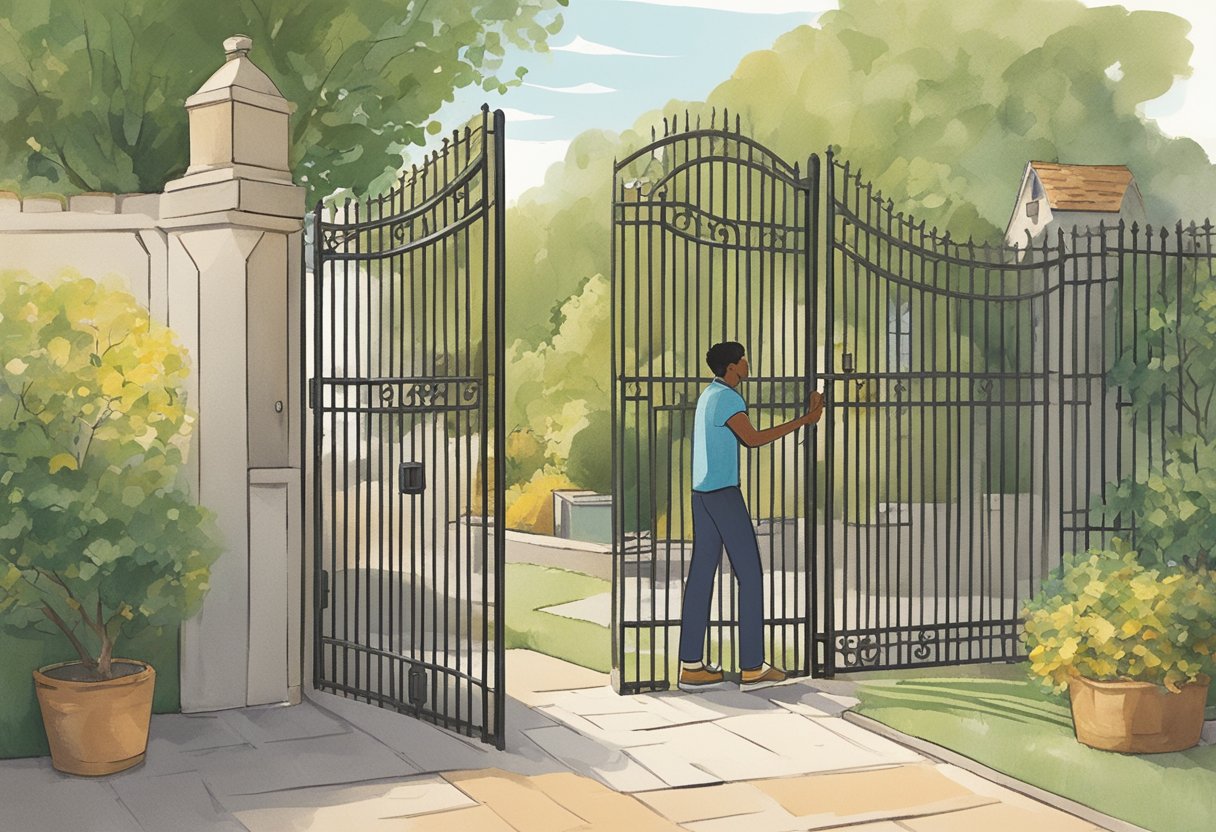

- Directory
- Recent
-
Featured
-
Featured
- Recent
-
- Programs
- Digital Nomad
- Side Gigs
- Resources
Select Page
![]() 10 people find this post amazing!
10 people find this post amazing!

Property caretaking is a profession that demands a variety of skills and offers the opportunity to work in numerous settings, ranging from private estates to commercial properties. The role of a property caretaker involves managing the maintenance, security, and overall operations of the property they are responsible for. Individuals in this field must demonstrate a diverse skill set, including basic repair work, groundskeeping, and sometimes more specialized tasks depending on the property’s requirements.
To enter the field of property caretaking, one doesn’t necessarily need formal education; however, certain qualifications and experience can significantly increase job prospects. For example, familiarity with building systems, landscaping, or even specialized training such as the OSHA 10-Hour General Industry Safety and Health Course can prove invaluable. Those looking to pursue a career in property caretaking should focus on gaining relevant knowledge and experience in fields related to property management and maintenance.
Property management is an integral aspect of the real estate sector. Property managers are responsible for the maintenance, operation, and oversight of real estate properties. This role is pivotal, especially in the context of residential property managers who ensure that rental homes are well-maintained and tenants’ needs are addressed.
Services provided by property management companies include, but are not limited to:
Effective property management necessitates a thorough understanding of the local real estate market. It also involves compliance with building codes, safety regulations, and environmental laws to prevent legal issues.
Tasks & Responsibilities:
Additionally, property managers need to be adept in various skills to manage the diverse challenges they face. They must be knowledgeable about current market conditions to optimize rental rates and maintain occupancy levels.
By offering a suite of services, property management professionals alleviate the burden on property owners, ensuring that their investment is profitable and that regulations are adhered to. For those keen on a career in this field, developing a comprehensive skill set is required, ranging from technical know-how to customer service proficiency.
In the world of property caretaking, the roles and responsibilities define the success of daily operations. A property caretaker ensures that facilities are operational, tenants are satisfied, and the financial aspects are managed meticulously.
A property caretaker plays a vital role in tenant relations, acting as a liaison between the tenants and landlord. They are responsible for addressing tenant concerns, conducting routine check-ins, and fostering a positive living environment. Efficient communication is key, often involving:
Property caretakers are responsible for the maintenance and repair of the property, ensuring that everything is in working order. This includes a wide array of tasks from routine upkeep to emergency repairs, all while ensuring compliance with safety regulations. Their duties encapsulate:
The financial management aspect of property caretaking involves meticulous oversight of all monetary transactions. Property caretakers ensure that finances are in order, which includes:
In each aspect of their role, property caretakers bridge the gap between landlords and tenants, ensuring that properties remain attractive for prospective renters, existing tenants feel valued, and the financial health of the real estate investment is secure.
When beginning with property caretaking, a sharp focus on marketing is crucial. A caretaker’s ability to attract tenants relies on an effective marketing strategy that makes the property visible across a variety of platforms. An income stream is established once the property is occupied, so minimizing vacancies is the cornerstone of profitability.
Essential steps in marketing involve:
Leasing is the next critical phase, where interest is converted into contracts. This requires:
| Step | Description |
|---|---|
| Knowledge of the Market | Understanding the competitive landscape to set attractive prices. |
| Effective Advertising | Leveraging digital and traditional platforms for maximum visibility. |
| Efficient Process | Automating and guiding the leasing process to be user-friendly. |
By implementing these strategies, a property caretaker can decrease time on the market and increase the property’s income potential. The partnership of strong marketing and leasing practices not only fills vacancies but establishes a solid foundation for long-term occupancy rates.
When embarking on a career in property caretaking, understanding the legal intricacies is crucial. Property caretakers must be well-versed in the different aspects of leases, evictions, and compliance with various laws to ensure the protection of both their interests and the rights of the tenants and landlords they serve.
A property caretaker needs to have a clear grasp of the eviction process as set forth by state and local laws. Key points include adherence to the specific lease terms, proper notice requirements, and legal grounds for eviction. Here are steps commonly involved:
For tenants with a pattern of late payments or lease violations, documentation can be essential in the legal proceedings.
Property caretakers must ensure that the maintenance and management of the property comply with all relevant building codes and safety regulations. This includes:
Compliance entails maintaining open communication with landlords about the state of the property and any legal issues that arise, including those concerning lease terms and contracts. This helps to preempt any legal disputes and ensures a safe living environment for all tenants.
Property managers play a critical role in the financial operations of a real estate investment. They ensure that all accounting records are meticulously kept and that financial transactions related to property management are conducted smoothly.
Rent Collection: A central component of financial management is the efficient collection of rent. Property managers facilitate timely rent payments and minimize delays, which is fundamental to maintaining a steady income stream for property owners.
Expenses Tracking: Property managers meticulously record all expenses related to property maintenance and repairs. They organize invoices and receipts, which are essential for both budgeting and taxation purposes.
Financial Reporting: Monthly and annual financial reports are provided by property managers to give owners a clear view of their investment’s performance. Reports include income statements, balance sheets, and cash flow statements.
| Financial Aspect | Description |
|---|---|
| Accounting | Systematic and comprehensive recording of financial transactions. |
| Budgeting | Analyzing expenses and revenues to forecast future financial requirements. |
| Cash Management | Ensuring sufficient liquidity to meet operational needs. |
In summary, property managers leverage their expertise to minimize financial risk, ensure accurate reporting, and maximize property profitability. They seamlessly integrate tools such as property management software to automate these tasks, which provides insights and analytics for better financial decision-making.
Property caretaking primarily revolves around two pivotal components: ensuring the safety and security of the property and conducting regular property care activities to maintain its condition. Proper maintenance and upkeep can prevent costly repairs and ensure the property remains a welcoming and functional space.
Safety and security measures are critical in property maintenance. They must check and maintain all safety devices such as smoke detectors, carbon monoxide detectors, and fire extinguishers regularly to ensure they are functioning correctly. It is also essential for caretakers to inspect the property for potential hazards, like loose railings or damaged flooring. Additionally, ensuring that all locks and security systems are in working order can deter unauthorized access and protect the property and its occupants.
In the realm of property care, consistent upkeep is crucial to prolong the lifespan of the property’s assets. Caretakers should develop a schedule for routine maintenance tasks, including:
Implementing a structured approach to preventive maintenance and addressing property maintenance needs as they arise will keep a property in prime condition and help avoid unnecessary expenses or emergencies.
Embarking on a career in property caretaking involves continuous learning and professional community involvement. Certifications and networking play crucial roles in enhancing one’s qualifications and opportunities within this field.
Certifications serve as formal recognition of professional expertise in property caretaking. Pursuing a Certified Property Caretaker (CPC) credential is beneficial for caretakers aiming to demonstrate their knowledge of the best practices in property management and maintenance. These certifications are designed to instill a deep understanding of various caretaking tasks including upkeep, repairs, and tenant liaison. For instance, the Certified Property Caretaker program can significantly enhance a caretaker’s job prospects.
Certifications can be obtained from reputable organizations, such as the National Apartment Association (NAA) and the National Association of Residential Property Managers (NARPM). Both provide resources and development programs that are highly regarded in the industry.
Joining associations like NAA and NARPM is pivotal for networking, as they connect caretakers with peers, mentors, and potential employers. These associations facilitate:
For example, NARPM provides a platform for property managers and caretakers to grow by offering professional development and networking opportunities. They are instrumental in a property caretaker’s career advancement. Similarly, the NAA provides various opportunities for engagement and professional development across the property management spectrum.
In the evolving landscape of property management, technology plays a pivotal role. Marketers recognize the shift in dynamics as tech solutions create more efficient, transparent, and engaging avenues for service delivery. Various applications are at the forefront of this transformation, enabling property managers to excel in their roles.
Smart Home Technology has become a cornerstone in modern property management, offering unparalleled convenience and efficiency. Managers can now oversee multiple aspects of a property remotely, which directly benefits both tenants and operational workflows.
Artificial Intelligence (AI) now significantly influences the property management industry, addressing complex tasks from data analysis to predictive maintenance. This technology is not just a trend; it’s rapidly becoming integral in helping property portfolios thrive. It allows for the automation of repetitive tasks, giving managers more freedom to focus on strategic decision-making.
Property management is increasingly adopting Cloud Computing, which offers enhanced agility, efficiency, and security. Cloud services enable managers and their teams to access data and tools from anywhere, ensuring a more responsive service delivery framework.
Here is a snapshot of tech trends impacting the property management space:
| Trend | Impact on Industry |
|---|---|
| Smart Technology | Improved monitoring and control, enhanced tenant experience |
| AI & Automation | Operational efficiency, preemptive maintenance, data insights |
| Cloud Computing | Accessibility, scalability, and secure data management |
Property management service providers are adopting these technologies enthusiastically, aiming to improve the quality of their offerings and remain competitive. Stakeholders are investing in these innovations to stay ahead in a fast-paced environment and cater to the needs of tech-savvy customers.
Entering the property caretaking field requires careful preparation for interviews and a clear understanding of the job market. Potential caretakers should tailor their resumes to highlight relevant experience and anticipate being asked about their skills during interviews.
The process begins with a strong resume that emphasizes the candidate’s property maintenance and personal service skills. It should also list prior experience relevant to the duties of a property caretaker. Candidates can expect to encounter common property caretaker interview questions, which often probe into their hands-on maintenance abilities, problem-solving skills, and reliability. Effective preparation involves:
Understanding the job market is crucial for property caretakers. Entry-level positions are frequently listed on platforms like ZipRecruiter, where candidates can get an idea of the demand and expected salaries. The hiring process for caretakers can be competitive, with employers placing a high value on trustworthiness and a proven track record. To stay competitive, applicants should:
By preparing for interviews with a granular approach to the questions asked and comprehending the dynamics of the job market, individuals stand a better chance of securing employment in property caretaking.
When starting a property caretaking business, drafting a comprehensive business plan is foundational. It charts a course for income generation and business sustainability. This plan should detail the marketing strategies required to attract and retain clients and outline the services the company will provide.
Marketing plays a pivotal role in business growth, often focusing on online presence and customer service excellence. Companies must leverage various platforms to reach potential clients and engage with their community.
Offering a suite of services helps in diversifying income streams. Property management companies should strive to deliver full-service property solutions, covering maintenance to lease management, catering to diverse client needs.
Customer service excellence cannot be overstressed; it ensures client retention and referrals. Robust communication skills are essential, alongside effective problem-solving skills to address any issues that arise.
Operational efficiencies are gained through streamlined processes, which also contribute to robust risk management. Tasks such as tenant screening, rent collection, and regular property inspections are part of a proactive approach to managing potential issues.
Forming a Limited Liability Company (LLC) can offer personal liability protection and tax advantages, which is an important consideration when formalizing the business.
| Key Element | Consideration |
|---|---|
| Business Plan | Align goals and strategies |
| Income & Services | Diversify for stability |
| Marketing | Utilize online platforms |
| Customer Service | Prioritize communication |
| Operational Strategy | Streamline for efficiency |
| Legal Structure | Consider an LLC for protection |
In conclusion, successful property management intertwines strategic planning with exceptional operational and client management skills.
Property caretaking is a profession that requires a multifaceted skill set and unwavering dedication. Those who excel in this field often bring a combination of expertise and confidence to their roles, ensuring that properties are maintained to the highest standards. A successful property caretaker not only addresses the everyday tasks of maintenance and repair but also anticipates the needs of the property and its occupants.
The benefits of becoming a property caretaker include the opportunity to work in various settings, the satisfaction of preserving and enhancing the value of a property, and in some cases, the provision of housing as part of employment. With a strong reputation, a property caretaker can build a career that is both lucrative and rewarding, characterized by trust and long-term relationships with property owners.
To thrive in this industry, an individual must continually develop their knowledge base and practical skills, staying updated with the latest best practices in property management and maintenance. The role may challenge one’s adaptability and problem-solving capabilities, but it also offers the chance to demonstrate a high level of professionalism and caretaking excellence.
In summary, property caretaking is a viable and respected career path for those who show the necessary commitment and skill. It allows for professional growth and the chance to make a significant impact on the preservation and enhancement of properties they are entrusted with.
In this section, readers will receive clear and precise answers to help them better understand the essentials of starting and operating a property management company.
To establish a property management company, aspiring entrepreneurs should conduct thorough market research, formulate a solid business plan, and obtain any necessary local business licenses. They can learn more by understanding the diverse set of skills required to manage properties effectively.
Certification is not always a requirement for property managers, but obtaining certifications like the Certified Property Manager (CPM) can enhance credibility and expertise in the field.
Licensing requirements for property managers vary from state to state. Some states require property managers to possess a real estate broker’s license, while others may have specific property management licenses or no licensing requirements at all.
Building a property management company without prior experience can be challenging, but it is achievable through dedicated research, networking with industry professionals, investing in education and training, and possibly partnering with experienced mentors.
The potential benefits of starting a property management business include a stable source of income, diversity in daily tasks, and playing a key role in maintaining valuable real estate assets. Drawbacks can include the need for constant availability, the potential for high levels of stress, and the variety of skills required that are summarized on Homes in Transition.
A property management startup checklist should include securing business insurance, setting up accounting systems, drafting property management agreements, and establishing protocols for property maintenance, tenant relations, and emergency responses.
Table of Contents

Achieve Your Goals Now!
